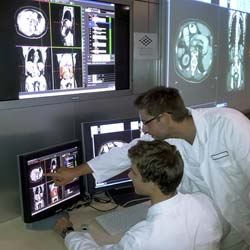Medico: Smarter Use of Medical Data

That's an important step on the path to personalized medicine. Medico is one of six application scenarios of the research program Theseus of the German Federal Ministry of Economics.
Since late 2007, approximately 60 partners have been developing new technologies for the “Internet of services.” In the case of Medico, researchers from Siemens are working with partners at the University Hospital of Erlangen, the German Research Center for Artificial Intelligence (DFKI), the Ludwig-Maximilians-Universität München, and the Fraunhofer Gesellschaft. Medico is one of the highlights at the concluding event of the research program Theseus, which is taking place on February 14 and February 15, 2012, in Berlin.
Medico will combine medical knowledge with new image-processing methods, knowledge-based information processing techniques, and machine learning technologies. This will allow doctors more efficient access to a wide variety of types of medical information: data from medical imaging technologies such as ultrasound, x-ray, or computer tomography scans, and associated information such as images, reports, or laboratory data that are scattered, unconnected, and have very heterogeneous formats.
Medico analyzes the content of medical data, structures it, links it with other information, and makes it readily accessible. The software identifies distinctive features in the images and catalogues data automatically. It not only collects and processes reference images but also takes into account treatment and laboratory reports from many different and scattered storage media in hospitals.
With Medico, for example, an anatomical structure like a “lymph node” referred to in a doctor's letter is linked with the corresponding location in medical images, which are made accessible through a hyperlink in the text. And with just one more click, the doctor can access extra information from an online knowledge base.
In the future, a variety of medical applications could be linked together in Medico. Features that have already been implemented in prototype form include semantic search, automated image analysis, indexing and patient classification, and context-sensitive diagnostic support.
In contrast to the systems used today, a doctor's knowledge can be formalized with logic and validated through verification algorithms. The researchers have created a comprehensive diagnostic assistance system that is generating keen interest among physicians.
Media Contact
More Information:
http://www.siemens.com/innovationnewsAll latest news from the category: Medical Engineering
The development of medical equipment, products and technical procedures is characterized by high research and development costs in a variety of fields related to the study of human medicine.
innovations-report provides informative and stimulating reports and articles on topics ranging from imaging processes, cell and tissue techniques, optical techniques, implants, orthopedic aids, clinical and medical office equipment, dialysis systems and x-ray/radiation monitoring devices to endoscopy, ultrasound, surgical techniques, and dental materials.
Newest articles

High-energy-density aqueous battery based on halogen multi-electron transfer
Traditional non-aqueous lithium-ion batteries have a high energy density, but their safety is compromised due to the flammable organic electrolytes they utilize. Aqueous batteries use water as the solvent for…

First-ever combined heart pump and pig kidney transplant
…gives new hope to patient with terminal illness. Surgeons at NYU Langone Health performed the first-ever combined mechanical heart pump and gene-edited pig kidney transplant surgery in a 54-year-old woman…

Biophysics: Testing how well biomarkers work
LMU researchers have developed a method to determine how reliably target proteins can be labeled using super-resolution fluorescence microscopy. Modern microscopy techniques make it possible to examine the inner workings…





















